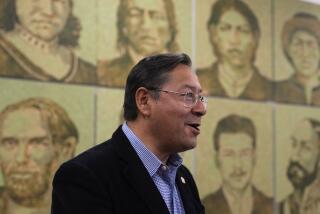Clarifying the Coup Attempt
The passage of time has clarified somewhat the events that occurred during last week’s coup attempt in Panama. While the decision to keep U.S. troops out of that particular fray was the right one, it now looks as if that happened not because Bush Administration officials planned it that way, but because events were too muddled, and moving too fast, for U.S. officials to do much except sit on the sidelines. That is worrisome for the Bush Administration, whose future crises may well involve matters more serious than a thug like Gen. Manuel Noriega.
Not surprisingly, the realization that U.S. power made little, if any, difference in the brief crisis has set off all sorts of recriminations in Washington. Administration officials want so badly to put the best face on their slowness in responding to events that Brent Scowcroft, Bush’s national security adviser, even tried to put the blame on Congress’ nit-picking of past foreign policy crises. White House Chief of Staff John Sununu, meanwhile, has ordered a study of how events unfolded last Tuesday to avoid a repetition when the stakes are higher. A few Democracts who are normally reticent about using U.S. military force in Latin America are demanding to know why President Bush didn’t use the coup as an opportunity to have U.S. forces grab Noriega and bring him to this country for trial on drug trafficking charges.
One Democrat who isn’t posturing on Panama is Sen. Sam Nunn of Georgia. He faults the Administration’s handling of the Panamanian incident for the right reason. Nunn argues that because of the fierce rhetoric that U.S. officials have directed at Noriega, beginning with former President Reagan, and with recent Bush statements all but inviting a coup, the White House should have been better prepared for the possibility Noriega’s fellow officers might take Washington seriously and turn on him. In fact, when the wished-for coup finally occurred, there were no contingency plans. And efforts to improvise were hampered by scant, or faulty, intelligence and poor communications.
U.S. military officials in Panama learned of the coup attempt only two days in advance and could not tell whether it would come off until fighting actually began. Once the fighting began, they had no way of communicating with the coup leader, Maj. Moises Giroldi, who had refused to give them a telephone number in Noriega’s headquarters where he could be reached. Giroldi and his aides made no effort to seek outside help until after Noriega’s forces counterattacked--when it was too late.
Communications were not much better in Washington. Administrations officials were scattered throughout the city, and as far away as Gettysburg, Pa., entertaining visitors that included Soviet officials and Mexico’s President Carlos Salinas de Gortari. At no time during the coup attempt did key Administration officials gather in the White House situation room to discuss events in Panama. And at meetings held by lower-level advisers, representatives of the Central Intelligence Agency were conspicuously absent. All in all, a lax and lackadaisical reaction to what could have been a major battle in Bush’s highly touted war on drugs.
But if the failed coup means that Noriega will be in power for longer than people in this country like, it is no cause for panic. In fact, Noriega is more besieged than ever. Giroldi was a close friend and aide-de-camp, so clearly the anger runs deep within the powerful Panama Defense Forces that Noriega commands. Even Noriega’s weak civilian puppets did not rally to his support until it was clear the coup had failed. Both facts are arguments for maintaining the diplomatic and financial pressure the United States has been putting on Noriega for the last two years. Noriega can’t outlast this country if the Bush Administration is patient and better prepared to react the next time opportunity presents itself in Panama.
More to Read
Sign up for Essential California
The most important California stories and recommendations in your inbox every morning.
You may occasionally receive promotional content from the Los Angeles Times.










